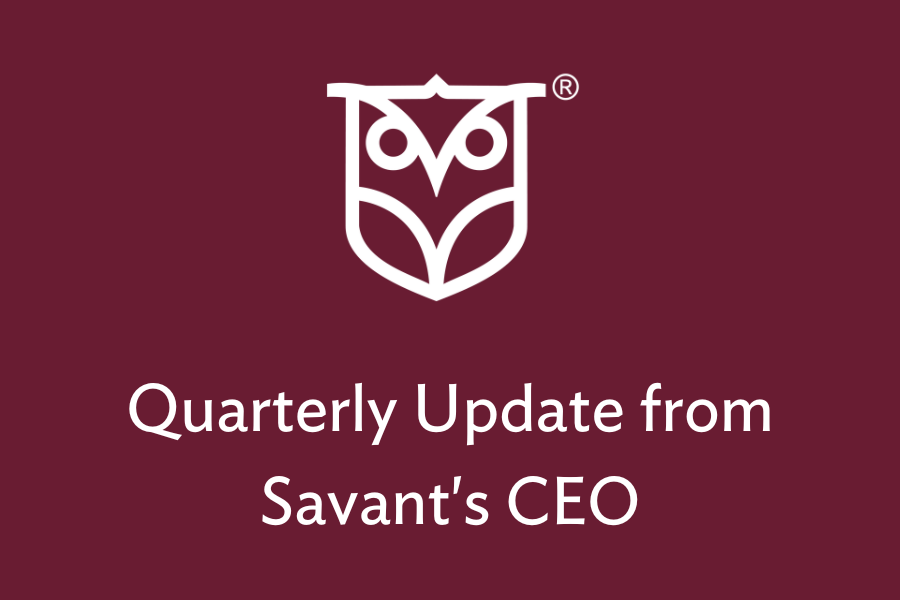Amid Market Turmoil, Focus On What You Can Control

Both evidence and experience tell us that events that move the markets are notable, precisely because of their unpredictability. Market declines don’t happen simply because a certain length of time has passed, or we achieved a target return. This is important to remember, now that we’ve weathered another challenging quarter for global markets, marking three consecutive quarters of losses for stocks and bonds.
Our patience is being tested and we all have questions no one can answer. When will inflation come down? Has the stock market hit bottom yet? How much higher will interest rates go? Are we in a recession? We do, however, know from history that difficult periods set up good opportunities on the other side.
Can Vs. Can’t
When working with clients, we focus on what we can control versus what we can’t control. We can’t control the direction and magnitude of markets and we can’t support getting out of markets when times get difficult. Our wise counsel involves having the discipline to stick to the fundamentals – something that separates true investors from market-timing gamblers. Much like professional athletes, relying on your mastery of the fundamentals can help greatly reduce overall risk and increase your chances of achieving a favorable result. While each bear market is unique, we can look to historical evidence and data to understand and communicate the range of possibilities. We can focus our efforts on activities such as tax-loss harvesting, rebalancing, providing counsel on adding to portfolios, and maintaining a proper asset mix.
Brighter Outlook for Bonds
While the rise in interest rates has been painful for bond investors, our forward-looking bond returns have increased thanks to higher yields. Bond returns are mostly a function of starting yield. Using the 10-year Treasury as an example, the yield was 0.50% in July 2020 when the bond market peaked. Effectively, no cushion existed for yields to buffer any pain from rising rates. The 10-year Treasury hit 4% near the end of the quarter, meaning investors could buy a risk-free asset and earn 4%! The current higher yields/income will help offset negative bond returns. Bonds still play an important role in portfolios and we are focused on managing high-quality bonds diversified across countries, sectors, and maturities.
Stocks and the “R” Word
After two quarters of negative economic growth, the “R” word (recession) is top of mind. We have mixed data signals, such as negative GDP supporting a higher risk of recession, with other data such as jobs, manufacturing/services activity, and household spending, not supporting it. If/when we do have a recession, we will find out on a lag. However, markets are forward-looking and historical data shows that on average, once we entered bear markets that included recessions, future returns for stocks averaged 19% over the next year in recessionary periods and a 12-14% return over the three-year and five-year periods post-recession. Global stocks, in aggregate, are attractively valued today meaning that company stock prices, relative to their earnings, are favorable. Historically, when we have had favorable valuations, subsequent long-term stock returns were better than average.
These are some observations about the economy and asset classes for the third quarter:
Economy
The labor market cooled slightly in September, adding 263,000 jobs. The number of open jobs per unemployed persons dropped to 1.6 from 2.0. Unemployment is low, at 3.5%. The latest inflation (CPI year-over-year) report for September remained high at 8.2%, primarily driven by shelter, medical care, and other services.
Stocks
Global stocks (MSCI All Country World IMI Index) fell 6.6%. Within U.S. markets, small stocks (Russell 2000 Index) fell less than large stocks (S&P 500 Index), -2.2% compared to -4.9%. International large stocks (MSCI EAFE Index) dropped by 9.4% with other international markets down a similar magnitude.
Bonds
Fixed income returns were negative for the quarter, as U.S. intermediate-term bonds (Bloomberg U.S. Aggregate Bond Index) were down 4.8%, while their international counterparts (JPM GBI Global Ex U.S. Index) lost 3.3%. TIPS (Bloomberg Global Inflation Linked U.S. TIPS Index) also struggled and fell 10.0%. The Federal Reserve raised the overnight rate twice during the quarter to a new target range of 3.00-3.25%.
Alternatives
Trend following (Credit Suisse Managed Futures Liquid Index) continued its strong performance, gaining 8.1%. Direct lending (Cliffwater Direct Lending Index) also gained with a 2.5% return. On the negative side, reinsurance (SwissRe Global Cat Bond Index) was down 7.4%, as a result of loss estimates from the recent Hurricane Ian in Florida, while event driven (IQ Hedge Event-Driven Index) and real assets (DJ Brookfield Gbl Infrastructure Index) also dropped 2.0% and 10.9%, respectively.
Over the next couple of months, the Federal Open Market Committee is likely to continue raising interest rates as it walks a fine line between inflation and recession. And we’ll be here for you, to answer your questions and offer our insights. With the holiday season nearing, we wish you and your families happy and healthy times.
Sources: Morningstar Direct, Federal Reserve, Department of Labor.
Savant Wealth Management (“Savant”) is an SEC registered investment adviser headquartered in Rockford, Illinois. You should not assume that any discussion or information contained in this document serves as the receipt of, or as a substitute for, personalized investment advice from Savant. This is intended for informational purposes only.
Historical performance results for investment indices, benchmarks, and/or categories have been provided for general informational/comparison purposes only, and generally do not reflect the deduction of transaction and/or custodial charges, the deduction of an investment management fee, nor the impact of taxes, the incurrence of which would have the effect of decreasing historical performance results. It should not be assumed that your account holdings correspond directly to any comparative indices or categories. Please also note: (1) performance results do not reflect the impact of taxes; (2) comparative benchmarks/indices may be more or less volatile than your accounts; and, (3) a description of each comparative benchmark/index is available upon request.

